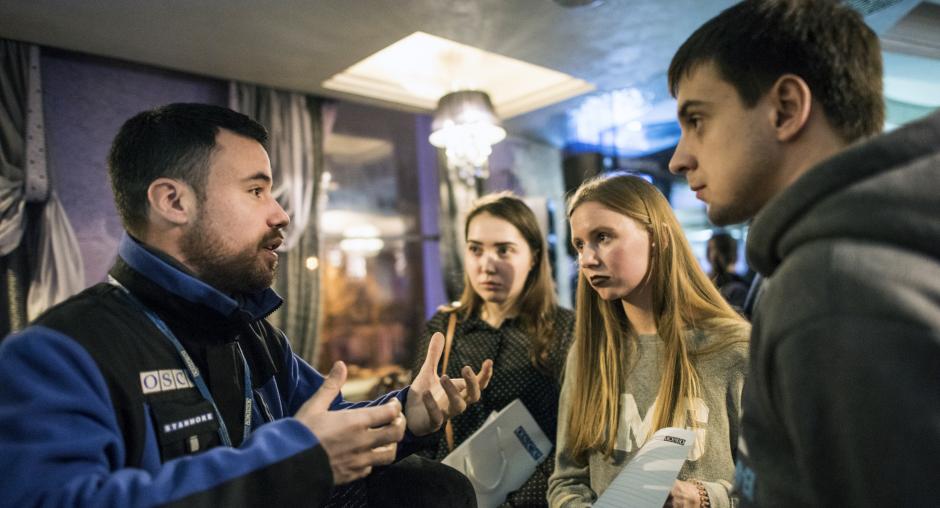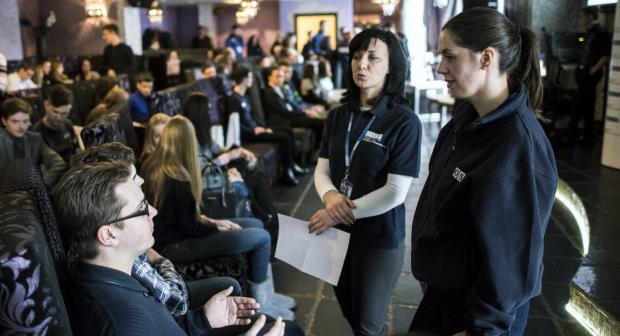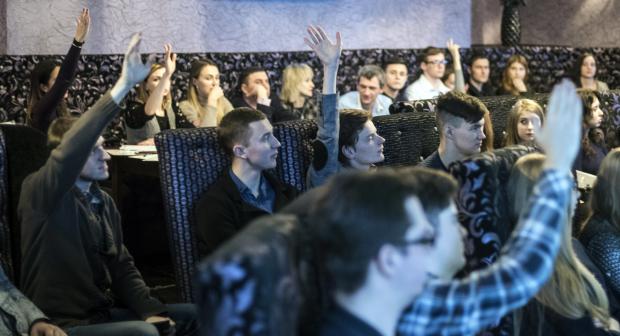OSCE Café in Luhansk: Kindling Discussion and Understanding
It was a cold February evening in Luhansk city; inside, the room was filled to capacity. Students, teachers and other curious residents of this town had accepted the open invitation of the OSCE Special Monitoring Mission in Ukraine (SMM) to join Principal Deputy Chief Monitor Alexander Hug and other monitoring officers for an informal public discussion on what the SMM does.
This was the 14th OSCE Café hosted by the Mission across the country in the past six months – a special one because it was held in the area not controlled by the government.
“A few years ago, this would not have been possible,” Hug remarks. When the SMM established its first permanent presence in Luhansk region in 2014, the situation was highly volatile. Four SMM officers were kidnapped; holding public events was out of the question. In the meantime, the team’s security capacity on the ground has been greatly strengthened, and it has built an extensive network of working relations with academic institutions, businesses and religious centres. “Their interest in our work makes outreach events like the OSCE Café possible and interesting,” says Hug.
Events like the OSCE Cafes are part of what the SMM does under its mandate, provided by the OSCE’s 57 participating States, to reduce tensions and help foster peace, stability and security. They are a chance for interested people to meet monitors face-to-face, to listen, ask questions and exchange thoughts.
Each OSCE Café has a particular theme – here it was “Facts Matter”. Participants discussed the role played by the SMM in verifying the sides’ compliance with the Minsk agreements; how facts established by the monitors on withdrawal of weapons, disengagement of forces and formations, de-mining and live-fire training strengthen the process and the ceasefire and minimize the impact of the ongoing conflict on the civilian population.
“The event was truly informative; I learned the answers to questions I have had for years,” said one member of the audience. “I would have liked the Q&A to last even longer,” said another.
Many national staff members of the SMM’s Luhansk Monitoring Team are locals who grew up and studied in the city. They played an essential role in organizing the Café, promoting it among peers and professors. “I found it inspiring to see some of my former university teachers coming to learn more about the work of the team I am now a part of,” said one of the team’s language assistants.
A quiz on the OSCE, with prizes, rounded out the evening. Also part of the event was a handover of messages of support, so-called “letters of peace”, from students of the Yuriy Fedkovych Chernivtsi National University on the other side of the contact line as part of another SMM outreach initiative. Several participants decided to write letters of peace of their own – they were delivered by the SMM to students of the Volodymyr Dahl East Ukrainian National University, relocated to Sivierodonetsk from Luhansk in 2014 when the conflict started.
“The SMM will continue to organize events like this in the future,” said SMM Oksana Dobrovolskaya, Press and Public Information Assistant. “Dialogue is the key to resolving this conflict, and dialogue and discussion are at the core of every OSCE Café.”






